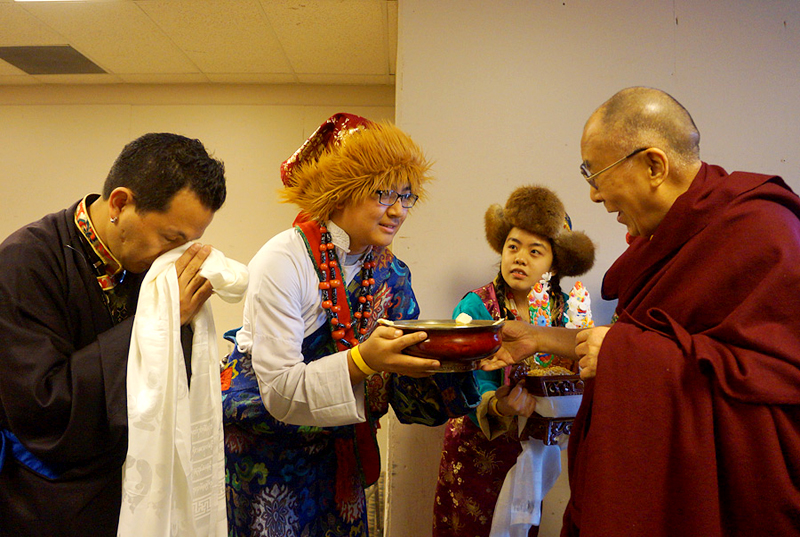 Minneapolis, Minnesota, USA — Explaining the major problems that are facing our world today are of our own making, the spiritual leader of Tibet, His Holiness the Dalai Lama said that "we can hope the government or the UN can do, but the real change starts with individuals."
Minneapolis, Minnesota, USA — Explaining the major problems that are facing our world today are of our own making, the spiritual leader of Tibet, His Holiness the Dalai Lama said that "we can hope the government or the UN can do, but the real change starts with individuals."
"Today I want to speak about some of the thoughts and experiences I've had as a human being, not as a Buddhist or as Dalai Lama," His Holiness said when he spoke to more than 3,000 followers on Sunday at the Minneapolis Convention Center.
He said he was committed to sharing with others how to help humanity live more happily and peacefully. The key is to develop a concern for others' well-being; a sense of compassion.
The Nobel peace prize laureate noted that many of the problems we face are of our own making, worst among them being when others are killed. He remarked that we feel concern when we hear about someone being killed by a tiger or an elephant, but we seem to accept reports of people killing each other as something normal.
The Tibetan leader reminded his listeners that although they were comfortable where they sat, at the same time, in other parts of the world, people were dying violently, some in the name of religion.
His Holiness drew attention to the link between our physical and verbal actions and our emotions. "If, instead of anger, hatred and suspicion, we were moved by loving-kindness, we would naturally have greater respect for others and our actions would be non-violent," he said.
His Holiness observed that we live in a materialistic world in which there is insufficient attention to human values. "We rely for satisfaction on material things rather than on warm-heartedness. But, as human beings, we are social animals. We need friendship and friendship depends on trust," he added.
Building trust depends on concern for others and defending their rights, not doing them harm. "Friendship has a direct link to warm-heartedness, which also has benefits for our physical health," he said, adding that "some scientists have found that constant anger, fear and suspicion undermine our immune system."
"In my experience, what we need is a calm mind and warm-heartedness provides a basis for that. That's how we make ourselves happy as individuals in families, local communities and nations. I believe that if we can train those who are young today in these qualities the world will be a more peaceful place later in this century.
"I try to promote human values because we tend to forget that we are all the same as human beings. If you think of me as your friend, try to do the same. This is not something we can hope the government or the UN can do, real change starts with individuals. We each have to make a contribution. I request you to do so too," he stressed.
"Let me add one thing," His Holiness resumed. "I've been in conversation with scientists for more than 30 years. Many of them show an interest in learning about the science of the mind. Ancient Indian understanding of the mind is profound when compared to modern psychology which seems to be at an early stage of development.
"However, scientists have shown that even infants who are too young to talk can distinguish between illustrations of harmful and helpful behaviour and respond positively to help and negatively to harm. They conclude that basic human nature is compassionate. And this gives us hope."
The spiritual leader of Tibetan Buddhism explained that his second commitment is to promoting inter-religious harmony. "Despite their apparent philosophical differences, all religions carry a common message of love, forgiveness and tolerance," he added, saying "their common purpose is to produce compassionate human beings."
He cited the examples of religious people dedicated to the service of humanity. He noted too that the Buddha taught different things at different times and places to different people. "This was not because he was confused, nor because he sought to confuse others. It was because he appreciated that people of different aptitudes respond better to different explanations, much as the same illness may respond to different remedies," he said.
Pointing out that many religions teach about God the creator, there are others, a branch of the Samkhya tradition, Jainism and Buddhism among them, that teach that responsibility for what we do and what happens to us rests on our own shoulders.
However, thinking of God as a being of infinite love and seeking to emulate him is a very powerful practice. "Those of us who follow a religious practice ourselves have a responsibility to work to foster inter-religious harmony."


![Tibet has a rich history as a sovereign nation until the 1950s when it was invaded by China. [Photo: File]](/images/stories/Pics-2024/March/Tibet-Nation-1940s.jpg#joomlaImage://local-images/stories/Pics-2024/March/Tibet-Nation-1940s.jpg?width=1489&height=878)















